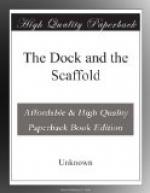In the course of the trial, which was had before Chief Baron Pigot and Mr. Justice Keogh, in the Commission Court, Dublin, Colonel Warren offered some few remarks on the evidence, and put some questions to the witnesses, all of which showed considerable acumen on his part, and were thoroughly ad rem. He complained particularly of the manner in which his identification was obtained. Gallagher, who had piloted the “Erin’s Hope” around the west coast of Ireland, swore to his identity as one of the party who were on board; but the prisoner contended that Gallagher’s knowledge of him was acquired, not on board that vessel, but in Kilmainham gaol, where Gallagher had been his fellow-prisoner for some weeks, during which time he had abundant opportunities of learning his, Colonel Warren’s, name, and the charge against him. But it was a vain thing, as far as the jury were concerned, to indulge in such criticisms of the evidence. There were times in Irish and in English history, when juries could rise above the panic of the hour, and refuse to minister to the passion of the government, but we have fallen upon other times, and, now-a-days, to be accused of a political crime means to be convicted.
A verdict of “guilty” against Colonel Warren was returned as a matter of course. On Saturday, November the 16th, he, with two other prisoners, was brought up for sentence. On the usual interrogatory being put to him, the following proceedings took place:—
I claim the privilege established
by precedent. I have had no
opportunity of making any
remarks on my case, and I would now
wish to say a few words.
THE CHIEF BARON—Just
state what you have to say; we are ready
to hear you.
WARREN—I desire, in the first place, to explain, while ignoring the jurisdiction of this court to sentence me, and while assuming my original position, my reasons for interfering in this case at all. I can see beyond my present position, the importance of this case, and I was desirous to instruct the jury, either directly or indirectly, of the importance of their decision, while never for a moment deviating from the position which I assumed. I submit that I effectually did that. They incautiously, and foolishly for themselves and the country of which they claim to be subjects, have raised an issue which has to be settled by a higher tribunal than this court.
PRISONER—I propose
to show that the verdict is contrary to
evidence.




